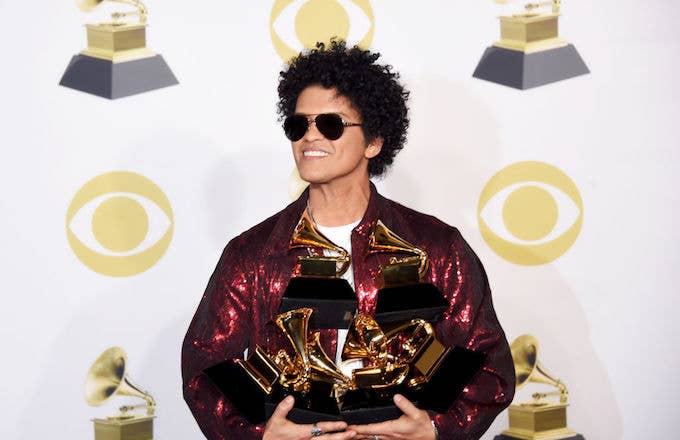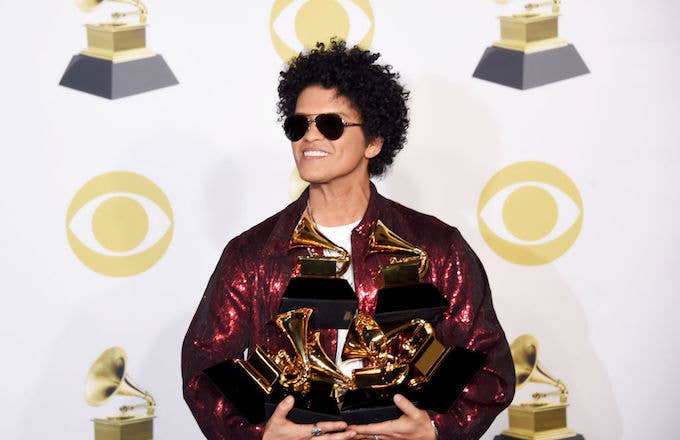
The discourse is a relentless cycle. Every conversation that has been had, will be had again. Rinse and repeat. That counts doubly in the music industry today, where artists are picked apart, piece by piece, have their worth evaluated, and are faced with judgment on whether they belong in the spaces they're occupying. Which brings us to the great Bruno Mars debate.
Just over a month ago, Bruno Mars took home six whole Grammys; half of them were under the R&B category. The other half were for the major categories: Record of the Year, Album of the Year, and Song of the Year. He cleaned up, and some felt like he was the Academy's—and the industry's—safe bet for pushing forth the black sound without betting on black for real.
Fast-forward to Thursday night, when culture commentary site The Grapevine released a two-part, one-hour discussion about Bruno Mars and cultural appropriation. One perspective in particular stood out, and was clipped and shared to social media, where it promptly went viral. It came from writer/YouTuber/artist/activist Seren Sensei, who felt like it didn't make sense that Bruno, a non-black performer, has been praised for essentially recreating black art.
this is why i hate bruno mars @seren_sensei says it all pic.twitter.com/CRLktsA2ea
"He is not black at all and he plays up his racial ambiguity to be able to... cross genres and go into different places," she said. "Bruno Mars has an Album of the Year Grammy, Prince never won an Album of the Year Grammy. So, how are you going to say that people who are originators in the funk genre, originators in R&B, New Jack Swing—Bobby Brown and New Edition don't have no Album of the Year Grammy. Bruno Mars got that Grammy because white people love him because he's not black, period. The issue is we want our black culture from non-black bodies, and Bruno Mars is like, 'I'll give it to you.'"
Sensei's comments were polarizing, to the say the least, and re-ignited the wider conversation about appropriation. Some online agreed with her, while others thought she was wilding/the debate was tired/what about the real offenders?:
we got musicians out here who are registered sex offenders, beating women, sayin the n-word when they ain’t black, and never cutting a check or crediting the black voices they pilfer from
and we comin for bruno???
sigh. i just don’t know if the zero-sum condemnation that cultural appropriation implies is a useful framework anymore
Bruno Mars is a “culture vulture”, but a guy from Canada comes out with caribbean singles and a fake accent, and yall danced to it and made it a #1 single. I guess culture vultures are based on fandom.
Complex spoke with Seren Sensei to get her thoughts on how this conversation blew up, why she got reported on social media, and whether there's anything Bruno can do to not be seen as a cultural appropriator.
What was your preparation like for this discussion? Was that all off top or did you have your receipts ready?
I have my own personal YouTube channel in addition to being a part of The Grapevine. I actually made my first video about Bruno Mars like 2 or 3 years ago—I've been wondering about if Bruno Mars is a cultural appropriator for the last 2 to 3 years. And when he did Superbowl 50, his performance with Beyoncé, I made another video like, "How do we feel about this?" He's coming out in like, big gold chains and Adidas, the whole Run-DMC type look. How do we feel about this?
I did a video on "Uptown Funk" and extrapolated how he straight up copies funk and R&B and stuff like that. And then when he did that "Finesse" song with Cardi B, I did another video. I have like 3 or 4 videos on Bruno Mars where I've thought about what exactly is going on with him as an artist, and in terms of musical genre and his appearance and the way he presents himself and the things that he's doing. So by the time we decided we were gonna talk about it on The Grapevine, I kind of thought, "Well, I have years now of thinking about this."
Last summer, I did a presentation at the Vincent Price Art Museum that was actually, I utilized memes as a way to address the phrase "Don't believe me just watch," when Trinidad James said it vs. when Bruno Mars says it and how it's perceived and what that means. So, I was ready.
I, and most people, have only seen that two-minute clip. What was the reaction like in the room?
I'm not gonna say they agreed with me necessarily, but they understood my point. I was really ready for a fight after doing my previous videos, that people always wanna argue with me about. But I kinda feel like—I said this in the panel in the full clip—a lot of the time we think about cultural appropriation, especially here in the United States, in terms of this black/white dichotomy. When you start bringing in non-black persons of color, it gets a little bit more murky and muddy about what's okay and what's not okay.
I actually think it's important to start having these conversations. I feel like we've all gotten to the point where we can admit Iggy Azalea is a cultural appropriator. When it involves white people, we kind of have more of a collective understanding of it. Even if people don't agree with me, the reaction of that was like, "Oh, I kind of see what you're saying, I'm gonna think about it." Which I feel like is the most important thing.
What have your mentions been like?
My mentions are in shambles. [Laughs.] Bruno Mars fans are actually mass reporting me—they got me blocked on Twitter for a whole week. Got my account locked. This also happens all the time on my personal YouTube channel. A lot of these report functions are ran by algorithms, and people have figured out that if you get enough people to report and down-vote, it tricks the system and automatically locks you out. Like, "Oh, enough people reported this account, so this account must be doing something wrong." So a lot of Bruno fans have been reporting me, so I got locked out. But I appealed it. There's a lot of interesting conversations in my mentions, but there's also just a lot of like, "Ahh, you fucking bitch, blah blah blah." There's a lot of people like that.
Just to clarify, you've been blocked on Twitter or YouTube?
Twitter, for 7 days.
Is that why you haven't been active?
Yeah, that's why. I'm locked, I can't tweet anything.
Wow.
I got locked on Twitter before for 7 days for saying Miley Cyrus was an appropriator, and white trash. Her stans got really mad and did the same thing and I was locked for that also. So, I'm used to it.
What are other examples you can think of of black art not being appreciated through black bodies?
I would say K-pop comes to mind immediately. K-pop is also an example of non-black people of color playing around with specifically Black American stereotypes and tropes in a way, and really blowing up. Like, a lot of these K-pop girls, they basically are doing R&B, pop, like Destiny's Child type music. A K-pop girl can do a Destiny's Child type of routine, or a 3LW type of routine, or Blaque type of routine, and it's pop, right? It's K-pop, Korean pop music. It's cute and it's fun, and it's seen in a certain type of way. But if a black girl did that same exact thing, it'd be seen as R&B. So, that comes to mind immediately.
The obvious Bruno Mars who we're talking about right now. The Ed Sheerans, the Sam Smiths, who are white, just people that—when black people do what are seen as historically black art forms of any kind—but especially music—there's no novelty. It's like, "Okay, yeah. Niggas rap." Or they do R&B, or they do hip-hop, or they sing gospel music, whatever. But then when a white artist or a non-black artist, a non-black person of color, comes along like an Adele or an Ed Sheeran or a Sam Smith or a Bruno Mars, it's a novelty. It's like "Wow!" Even among black people. Like, "Look at this non-black person doing what we can do and they're doing it so well, it's so amazing!" And it gets elevated and amplified in a certain way—that's racist. That's not fair.
A lot of people say, "What would you rather have these artists do? You don't want them to do what they love?" You have to recognize that you're benefiting from a system of racism and white supremacy that literally elevates you solely because you're not black, and keeps black artists kind of in a certain lane and in a certain place. As long as you're benefiting from that, that makes you an agent of white supremacy, as far as I'm concerned.
Some would say that Bruno is not culturally appropriating because it's the industry that's accepting and pushing him forward, like, "Oh, look at this novel act." What would you say to people that are like, "It's not Bruno's fault, he's paying homage"? Is there anything else he can do?
I feel like it's great that he recognizes his influences. It's great that he pays homage, but I personally don't think that's enough. I have an issue with Bruno being an unoriginal artist, he's not a unique artist, he's not a creative artist. I've also said this in my own videos on him. The video he did for that song "Finesse," it's like, this whole song sounds like a word-for-word creation of a TLC song; the video is a complete recreation of In Living Color.
This is why people say he's a karaoke artist or he's a wedding singer, because he's not doing anything unique. He's not doing anything creative, or original. He doesn't take inspiration; he basically does a recreation of things that already exist. So to me, if you're gonna be a real artist, an Album of the Year award-winning artist, you need to just stop blatantly copying. I don't know when it became okay to just blatantly copy, but if you're gonna be a musician, he needs to No. 1: stop copying.
No. 2, I don't think he does enough specifically, explicitly pointing out racism. I respected what Adele did when she got her Album of the Year award because she literally went up there and said, "What the fuck does Beyoncé have to do to get this award?" Like, say it! Call it out. You have privilege as a non-black person: You're allowed to enter into certain places and win certain awards and have these moments where you have a whole world that's watching you up there getting these awards. You could get on the mic and say something explicitly about the system of racism and white supremacy and how that's played into you getting this award.
People also love to say, "Well, nobody else is doing funk, nobody else is doing R&B. How can you get mad that Bruno is having all this success?" But no, that's not true. There are so many black artists—like, Anderson .Paak comes to mind immediately—who are in that lane, but they can never get amplified to the point of a Bruno Mars, specifically because they're black artists in a traditionally black lane. He needs to use his privilege a lot more to call out the system, to amplify black voices, and to give back. I don't think Bruno Mars is ever gonna do that. I think that he's complicit, and I think he's perfectly fine with the way things are going on. I think people are naive. I think they think he's some perfectly innocent babe in the woods, and I don't buy that.
Are you a fan of any non-black artists making traditionally black music?
There are some singers that I like. None coming to mind. But—no, no one's coming to mind. But I know there's some I like.
I'm assuming that means you think some artists can exist in this space without being problematic?
I think they can. I just think it all depends on how you're using your voice. Are you amplifying black voices? Are you being aware and cognizant of the way you might be being used as a tool in this system? Are you complicit in that? Are you fine with that? Are you using your privilege?
We all have various factors of privilege: how can we use that to fight against racism and fight against inequality and against these certain types of things? I'm not the hugest fan of Adele, but I think what she did at the Grammys last year, we need to see more of that. From Taylor Swift or Miley Cyrus—they'll call out Nicki Minaj for something they don't like her saying, but they won't get onstage at an award show and speak out about racism or BLM. How are you using your platform, how are you using your voice, how are you using your privilege? Especially as somebody that is moving in these types of spaces. Taylor Swift has a whole song with Kendrick Lamar, but hasn't said not one word about Black Lives Matter. I have an issue with that. You wanna take advantage of our culture and ignore other things when it doesn't suit you, that's the prime example of cultural appropriation.

